
THE VOICE OF INTERNATIONAL LITHUANIA
|
VilNews has its own Google archive! Type a word in the above search box to find any article.
You can also follow us on Facebook. We have two different pages. Click to open and join.
 Click on the buttons to open and read each of VilNews' 18 sub-sections Click on the buttons to open and read each of VilNews' 18 sub-sections  |
- 1.Front page
- 2.About VilNews
- 3.Lithuania today
- 4.Historical Lithuania
- 5.Photos from Lithuania
- 6.Travel Lithuania!
- 7.Lithuania in the world
- 8.The world in Lithuania
- 9.Litvak forum
- 10.Culture and events
- 11.Real estate - architecture
- 12.Business, economy - investments
- 13.Education, research and development
- 14.Sport and leisure
- 15.Health and wellbeing
- 16. Visit markets - Go shopping
- 17.Lithuanian food and beverages
- 18.Hotels and restaurants
Litvak forum sidebar
- Posted by - 18239(0) Commenthttps%3A%2F%2Fvilnews.com%2F2012-12-182392012-12-28+10%3A20%3A400df53x21http%3A%2F%2Fvilnews.com%2F%3Fp%3D18239
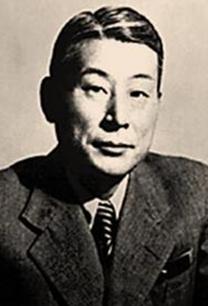
Chiune Sugihara:
The Japanese diplomat/spy who became a hero of the Holocaust
An article by Dr. Boris Bakunas, exclusively for VilNews.
Read it HERE
Comments:
__________________________
This man and his wife belong in the annals of history, not to be set aside, but to be lauded, loud and clear from every person with a heart and soul
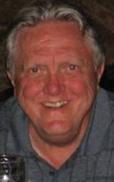
Bernard Terway
__________________________
Sugihara deserves to be placed among the giants in Lithuanian history.

Jon Platakis
__________________________
In Japan, where he was first considered to be a traitor, he is celebrated as a hero
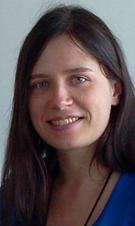
Daiva Repeckaite
__________________________
It is very important for Lithuanians, Israelis, the people of Japan, and people of goodwill around the world to spread their story as an example of what individuals can do to stem the hatred
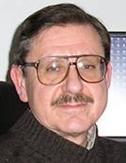
Boris Bakunas
- Bookmark :
- Digg
- del.icio.us
- Stumbleupon
- Redit it
- Posted by - 18201(0) Commenthttps%3A%2F%2Fvilnews.com%2F2012-12-182012012-12-26+12%3A42%3A210df53x21http%3A%2F%2Fvilnews.com%2F%3Fp%3D18201

Kovno Chief Rabbi Yitzchak Elchanan Spector (1817-1896), served as chief rabbi of Kovno, the most prominent rabbinical position at the height of 19th century Lithuanian Jewry.
Jewish postcards from the past
https://vilnews.com/?p=790
We were very impressed with the scope of the articles, photos and vast scope of coverage of all things Lithuanian

Stephanie Comfort's Jewish Postcard Collection has been featured in the online Lithuania News called the "VilNews e-magazine". The VilNews e-magazine was launched on February 15, 2011 and hopes to be one of the most comprehensive online resources for Lithuania.
We were very impressed with the scope of the articles, photos and vast scope of coverage of all things Lithuania and wish them much success.
- Bookmark :
- Digg
- del.icio.us
- Stumbleupon
- Redit it
- Posted by - 15140(3) Commenthttps%3A%2F%2Fvilnews.com%2F2012-08-151402012-08-25+09%3A50%3A230df53x21http%3A%2F%2Fvilnews.com%2F%3Fp%3D15140
Harley Felstein, chair and founder of the Sunflower Project in USA, hits back:
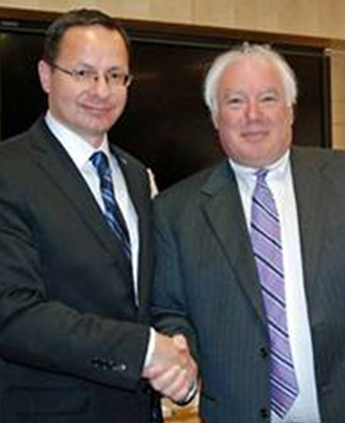
Zygimantas Pavilionis, Lithuanian ambassador to the U.S. (left),
and Harley Felstein of the Lithuanian Heritage Project
I have been under tremendous personal attack in certain press circles during the past month. The attack issues are mean-spirited and unwarranted
See also:
https://vilnews.com/?p=9949
https://vilnews.com/?p=13081
My fellow colleagues of Lithuanian descent, I would like to thank you for your staunch and unwaivering support over the past 18 months. My family’s documented roots in Lithuania trace back to the 1700’s, in and around the small town of Rokishkis in northeast Lithuania. As the chair and founder of the Sunflower Project, whose mission is to bridge and reconnect the Lithuanian people with the Jewish community of Lithuanian descent, I knew from the outset that to make progress and re-connect our deep roots was going to be a tremendous challenge.
As you maybe aware, I have been under tremendous personal attack in certain press circles during the past month. The attack issues are mean-spirited and unwarranted. The allegations have included that I have no connection to Lithuania (false), that I don’t know anything about Jewish cemeteries and their maintenance (despite my having worked in the funeral industry and in Jewish cemetery management for over 40 years professionally) or that somehow I am a “agent” of the Lithuanian government (absurdly false) as I am an independent volunteer who has been made aware of a need, and with others of like mind, am seeking to create an atmosphere of positive change.
You know the historical roots between the Lithuania and Jewish people are very deep - going back to between the 12th and 13th centuries. Those very roots can be re-established. But we need patience. We need understanding. We need reconnection. Focusing on death, deportation and destruction without a thoughtful view forward with steps towards reconciliation will simply make estrangement deeper. Yes, there’s a terribly painful past to acknowledge (much of which was suppressed in the years of Soviet domination) but there’s also a better future to envision – particularly as Lithuania accepts the responsibility of its incoming term Chairing the European Union
The Sunflower Project understands these mechanisms. We have already held successful events such as the first North American Joint Chanukah/ Kucios celebration last December at the Lithuanian Embassy in Washington, DC, with members of the greater Washington DC Jewidsh and Lithuanian communities in attendance. And we are planning new events for the fall and winter. The Sunflower Project understands how welcoming the atmosphere is during these events. Please note, there are two concerts being planned—one in Washington DC and one in Chicago which will highlight Jewish and Lithuanian musical traditions.
Therefore, please continue your support for the Sunflower Project. Please reach out to your neighbors and engage in constructive dialogue. Please feel free to write to me (harleyfelstein@yahoo.com) and let me know your thoughts.
- Bookmark :
- Digg
- del.icio.us
- Stumbleupon
- Redit it
By reading Israeli newspapers one can hear more sobering voices. I say, It is time to heal the wounds and start living in peace again, as we have done for hundreds of years
- Posted by - 12376(5) Commenthttps%3A%2F%2Fvilnews.com%2F2012-03-by-reading-israeli-newspapers-one-can-hear-more-sobering-voices-i-say-it-is-time-to-heal-the-wounds-and-start-living-in-peace-again-as-we-have-done-for-hundreds-of-yearsBy+reading+Israeli+newspapers+one+can+hear+more+sobering+voices.++I+say%2C+It+is+time+to+heal++the+wounds+and+start+living+in+peace+again%2C+as+we+have+done+for+hundreds+of+years2012-03-11+14%3A09%3A370df53x21http%3A%2F%2Fvilnews.com%2F%3Fp%3D12376
![]()
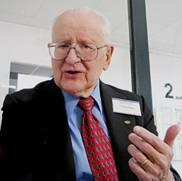
Vytautas Sliupas
By Vytautas Sliupas, California
“The Times of Israel”, March 11, 2012, carries a news article “Nazi hunter leads criticism of Lieberman for cordially hosting Lithuanian FM”. But not everyone was happy about this warm reception Foreign Minister Avigdor Lieberman gave his Lithuanian Counterpart. About a dozen demonstrators were carrying signs disapproving Foreign Minister’s Audronius Azubalis visit. Protest was co-organized by Efraim Zuroff, a well known Lithuania baiter.

Efraim Zuroff
The article further quotes: ”The Foreign Ministry in Jerusalem, however, seems unfazed by these accusations”.
My Kudos to both Foreign Ministers for trying to normalize the strained relations and to remove the mutual distrust.
There are Jewish voices that are more conciliatory and thoughtful. In the Comments column:

Arik Elman
Mr. Arik Elman writes “both the Nazi and Communist totalitarian regimes should be considered to be the main disasters of the 20th century. My family lost relatives to both and I really fail to see a problem to that statement… Why is that Mr. Zuroff is so fixated on a tiny Lithuania instead of looking to the West?”
Meir Rhodes
Mr. Meir Rhodes writes: …”both stalin and hitler were anti-Semitic monsters… stalin was preparing to deport and destroy the Jews in 1953…”
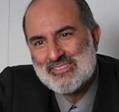
Zalman Lachman
Mr. Zalman Lachman writes: … “The argument who was worse, Hitler or Stalin, is just silly… While everyone is busy arguing about last generations haters, there is a fellow in Persia preparing to kill us all right now… Let’s face the present… Efraim, how about we make an effort… and let the Lithuanians deal with their own history”.

Daniel Teeboom
Mr. Daniel Teeboom writes: … “Efraim Zuroff… I think it is a mistake to allow events from 70 years ago determine who should be our friends and who should not… So really, why care about Baltic deflections and demand so much from prospective friends?”
By reading Israeli newspapers one can hear more sobering voices. I say, It is time to heal the wounds and start living in peace again, as we have done for hundreds of years.
Vytautas Sliupas
California
- Bookmark :
- Digg
- del.icio.us
- Stumbleupon
- Redit it
Lithuanian Jewish Community
- Posted by - 3199(1) Commenthttps%3A%2F%2Fvilnews.com%2F2011-02-writer-grigory-kanovich-%25e2%2580%2593-first-chairman-of-the-lithuanian-jewish-communityLithuanian+Jewish+Community2011-02-28+16%3A00%3A290df53x21http%3A%2F%2Fvilnews.com%2F%3Fp%3D3199
![]() Lietuvos Žydų Bendruomenė
Lietuvos Žydų Bendruomenė
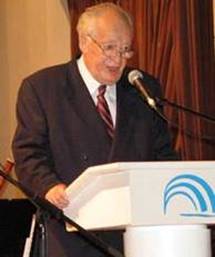
LJC Chairman Dr. Simonas Alperavičius
The Lithuanian Jewish Community (LJC) is an organisation offering a wide range of cultural, communal and social services from kindergarten to senior level activties. Dr. Simonas Alperavičius has been the leader of the organisation since 1992. Along with the two functioning houses of worship, their house at Pylimo 4 is where you can meet the genuine Jewish locals and read the country’s only Jewish newspaper, Jerusalem of Lithuania, available in English, Yiddish, Lithuanian and Russian. The building also houses a youth club, Jewish Student Union, Union of Former Ghetto and Concentration Camp Inmates and the Union of WWII Jewish Veterans.
The LJC Chariman, Simonas Alperavičius, was born 11 October 1928 in Vilnius. In 1933, his family moved to Kaunas, where he completed six grades at the Kaunas Sholom Aleichem Jewish gymnasium. At the outbreak of World War II, he and his parents escaped to Russia.
In 1944, Alperavičius returned to Vilnius, where he graduated from the city‘s 4th Gymnasium in 1947. In 1947-1952, Alperavičius studied law at Vilnius University and graduated magna cum laude.
Alperavičius spent a period working in the Klaipėdas regional Ministry of Justice, and in 1961-1988 he taught at the Ministry of the Interior.
In 1989, he became executive director of the Jewish Community of Lithuania and in 1992 he was elected chairman. In 2006, he was elected chairman of the Jewish Community of Vilnius. He currently leads the Religious Jewish Communities of Vilnius and Lithuania. Alperavičius helped organize the first and second World Litvak Congresses.
Writer Grigory Kanovich was the first Chairman of the nowadays Lithuanian Jewish Community
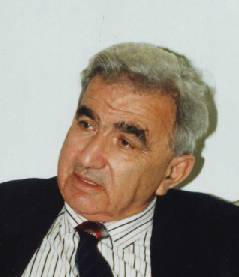
Grigory Kanovich is one of the most re-known contemporary Jewish writers novelist, play and script writers. Grigory Kanovich was born in traditional Jewish family on 18th of June 1929 in Jonava (Yonava), Lithuania. His family escaped the WWII and spent evacuation in Kazahstan and Ural. In 1945 his family returned to Vilnius where he took Slavistic studies at Vilnius State Universitywhich he graduated in 1953.
His first poetry book was published in 1948. The very first novel about Jews to be published (1959) in post-war Soviet Union was written by G.Kanovich “I Am Glazing At Stars”. It was highly valued by that time living classic of Russian literature Konstantin Paustovski. Since then G.Kanovich wrote number of novels a kind of saga - about the fate of East European Jewry from middle of 19th century till nowadays trilogy “Candles In The Wind”, dilogy “FOOLS TEARS AND PRAYERS”, “Smile Upon Us, Lord!”, ”Two penny kid”, ”There Is No Paradise For Slaves”, ”Turn Not The Face From Death”, ”The Jewish Park”, ” Leaves Of Fallen Trees”, ”Fascination of Devil” and others.
Kanovich, as a member of the Holocaust generation, writing in Russian, depicts his protagonists as spiritual and hardworking people with strong self-confidence, resting on religion and custom. By means of the narrative technique of memory, Kanovich creates a literary resurrection of the Lithuanian Jews as a people which was almost completely exterminated during the Holocaust.
Omnipresent pictures of cemetery and grave transform the Lithuanian space into a metonymy of death and, grotesquely, to the only place of home, being the”shelter” for the killed bodies of the Lithuanian Jewry. (Christina Parnell, Department of Slavic Literature, University of Erfurt,Germany) East European Jewish Affairs, Volume 38, Issue 2 August 2008 , pages 169 183) Both Kanovich's personality and the special circumstances in Lithuania relating to Jewish nationality turned him into a cultural symbol for a whole generation of Soviet Russian Jews (Velvl Chernin, Jewish Political Studies Review 14:1-2 (Spring 2002) Novels of G.Kanovich are published with turnaround of more than 1,5mio copies in 12 languages English, German, Hebrew, Polish, Chezch and others. Literary critics often compare works of G. Kanovich with those of Itzhak Bashevis Zinger.
G. Kanovich won numerous awards for his novels National Prize of Literature of Lithuania ( for his trilogy ”Candles In The Wind” 1989), best novel in Israel (1997 ”Jewish Park”), number of times his novels were among those to seek award of Russian Booker prize. His novel ”Seller of Dreams was among those nominated for International Booker award in 1997. His latest novel ”Fascination of Devil” is among nominees of Russian Booker award for 2009.
G. Kanovich is an author of more than twenty plays and scripts. A play based on his novels ”Smile Upon Us, Lord !” and ”Two Penny Kid” staged by Rimas Tuminas and performed by Vilnius Mazasis Teatras is considered the best theatrical performance in Lithuaniain the past 20 years. The play and actors have won numerous national and international awards among them First prize of International Theatre Festival of Baltic and North European Countries held in Sankt Petersburg, Russia.” Smile Upon Us, Lord is a production which touched me, overwhelmed me from head to toes, which made me cry and then laugh through tears. I belong to those who did read the novels of Grigori Kanovich and I have to say that all his novels build up a single large painting about the life of Lithuanian Jews, like a mosaic made of tiny colour stones, that you can't dismantle, which you can't share out, because this entirety, like the creation of Sholom Aleikhem, Iossif Babel, has already become a part of a newly discovered, fixed, stopped and already passed life. I never imagined that one could transfer it on stage, and do it so easily as if it was a research, a game, an improvisation, with the joy of being on the stage and of having a possibility to act” (http://www.vmt.lt/en/pages/view/?id=41).
In 1989 G. Kanovich was elected to the last Supreme Soviet in Moscow as a candidate of Lithuanian Independence movement Sajudis. He was among few delegates who have initiated a letter to last Soviet President Gorbachev about growing anti-Semitism in USSR. Letter was signed by 200 delegates of Supreme Soviet, including B.Jeltzin.
From 1989 till his repatriation in 1993 to Israel G. Kanovich was elected and served as a Chairman of Lithuanian Jewish Community. He remains an Honorary Chairman of this Community up to date. For his literature achievements and his role in Lithuanian culture GG. Kanovich was awarded by Lithuanian president V. Adamkus medal of Gediminas. G. Kanovich is a member of Israel and Russia PEN club. G. Kanovich and his wife Olga are residing in Bat Yam, Israel.
Source: http://www.gkanovich.com/
- Bookmark :
- Digg
- del.icio.us
- Stumbleupon
- Redit it
Jewish culture returns to Vilnius
- Posted by - 713(1) Commenthttps%3A%2F%2Fvilnews.com%2F2011-01-jewish-culture-returns-to-vilniusJewish+culture+returns+to+Vilnius2011-01-09+12%3A55%3A010df53x21http%3A%2F%2Fvilnews.com%2F%3Fp%3D713
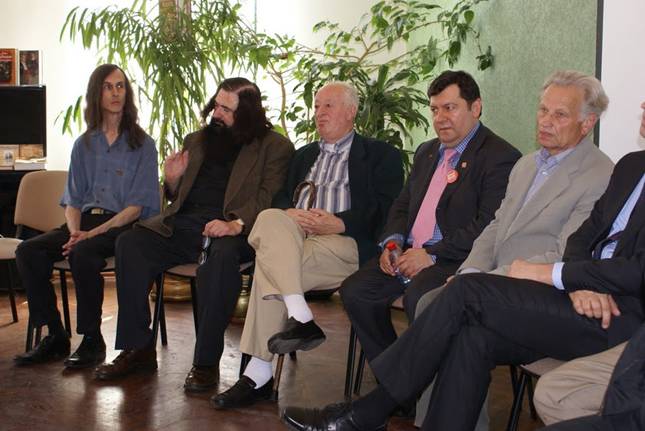
(Left-right): Wyman Brent, book collector,
Professor Dovid Katz, director of the Litvak Studies Institute,
Dr. Simonas Alperavičius, head of the Jewish Community of Lithuania,
Emmanuel Zingeris, Member of Seimas (Parliament),
Žibartas Jackūnas, Vilnius City Councillor
Photo: Žilvinas Beliauskas
10 June 2010 was an important day for bridge building and reconciliation in Lithuania, as representatives of the local Jewish community, the diplomatic corps and others met to participate in the first display of books compiled by American Wyman Brent.
Many of us had a certain feeling of participating in writing a new chapter of history when we met this early June day. Vilnius, which for hundreds of years had been one of the world's most important centres of Jewish culture and learning, was, as we know virtually wiped out from the Jewish world map during the Holocaust, but as we meet here - individuals from many countries, nationalities and cultures - this early summer day to celebrate that an American Baptist has collected more than 5,000 books for what eventually will become a Jewish library of 200,000 titles, the feeling of a new dawn is clearly present.
Wyman Brent's planned new library is not the only signal. Two other men, professor Dovid Katz and professor Mikhail Iossel, have also been very active recently. As a result, last year, the new Litvak Studies Institute was established in the premises of the Jewish community in Vilnius city centre.
These two events have not healed the wounds after the Holocaust in this country, and it will take a long time and many more efforts before this will happen. But it is important to maintain and preferably breathe new life into what was once a thriving Jewish culture here. The efforts that are now being made by these three gentlemen is nothing less than admirable, and one could therefore hope that 10 June 2010 represented a turning point in the positive direction.
- Bookmark :
- Digg
- del.icio.us
- Stumbleupon
- Redit it
World famous Litvaks
- Posted by - 843(5) Commenthttps%3A%2F%2Fvilnews.com%2F2011-01-world-famous-litvaksWorld+famous+Litvaks2011-01-09+12%3A54%3A200df53x21http%3A%2F%2Fvilnews.com%2F%3Fp%3D843
![]()
Many famous Jewish people lived and created in Lithuania. It was not for nothing that Vilnius was called "Jerusalem of the North" - as the wealth of its sages and of its religious scholarship competed with that of Jerusalem. The Jews made a large cultural and economic contribution, to both the Jewish people and to Lithuanians.
During the 19th and 20th century, tens of thousands of Lithuanian Jews emigrated to the United States of America. Many Lithuanian Jews also emigrated to South Africa which became famous as a haven for its 120.000 Jews who were spared the Holocaust. A small number also emigrated to the British Mandate of Palestine. The rise of the Nazis in Germany and the ensuing Holocaust destroyed the vast majority of Jews who had not managed to leave Lithuania and its environs.
Jews of Lithuanian origin are today in leading roles and positions around all the world – some of our nowadays most famous politicians, scientists, businessmen, economists, actors, writers and singers have Litvak background.
The Gaon of Vilnius

Elijah Ben Solomon (1720 - 1797).
The word "gaon" means genius and on no person could this title be more appropriately bestowed than on Rabbi Eliyahu of Vilna. Rabbi Eliyahu was probably the most influential Jewish leader in modern history.
Rabbi Eliyahu's great abilities began to show at a very early age. At the age of seven he gave his first public discourse and displayed a fully developed intellect. By the time he was ten he had advanced to the point where he no longer needed a teacher. When he was still a young man, Rabbi Eliyahu accepted upon himself "galus", self-imposed exile (a not unheard of practice at that time), in which he wandered from community to community as a beggar. This lasted for a period of some years whereupon he returned to Vilnius.
His diligence in learning was unsurpassable. The Gaon's son testified that for fifty years his father did not sleep for more than two hours in a twenty-four hour period. His breadth of knowledge was amazing, and he was knowledgeable in almost all secular fields and authored books on grammar and mathematics. His righteousness and kindness were also legendary. Despite his personal poverty he always gave 20% of his income to charity.
Possibly the Gaon's single biggest contribution to the Jewish people was his corrective notes on most of our ancient texts, particularly the Talmud.
The Gaon passed away in 1797 leaving behind a tremendous legacy, both from his vast and varied writings on all Torah subjects and from his outstanding students who went on to spread Torah throughout the people of Israel. After Solomon’s death, about 50 (out of surviving 70) of his works, mostly commentaries on the Bible and Talmud, were published, as well as The Principles of the Hebrew Grammar (1833), and the Fundamentals of Algebra, Geometry and Astronomy (1834).
Litvaks lead Israel
|
|
Prime Minister of Israel. Born 1949 in Tel Aviv, Israel. Grandson of Nathan MILEIKOWSKY from Lithuania, who changed his name to Netanyahu when he arrived in Tel Aviv from Lithuania in 1930. Mr. Netanyahhu‘s parents immigrated to United States, where he attended high school in Philadelphia, PA and later MIT and Harvard. A member of the conservative Likud party, he was Prime Minister from June 1996 to July 1999 and became the first (and to date only) Prime Minister of Israel to be born after the creation of the state. He was Finance Minister of Israel until August 9, 2005, when he resigned in protest of the Gaza Disengagement Plan advocated by Prime Minister Ariel Sharon. Mr. Nethanyahu is today the ninth and current Prime Minister of Israel, serving since March 2009. Netanyahu also serves as the current Chairman of the Likud Party, as a Knesset member, as the Health Minister of Israel, as the Pensioner Affairs Minister of Israel and as the Economic Strategy Minister of Israel. |
|
|
Ehud Barak Leader of Israel’s Labour Party and Minister of Defence and Deputy Prime Minister in Binyamin Netanyahu's government. Born 1942 in Kibbutz Mishmar Hasharon, Palestine), former Prime Minister of Israel (1999-2001). Ehud Brog (he changed his name to Ehud 'Barak' -lightening- when he entered the army) was born in a kibbutz which his father, who emigrated from Lithuania, founded in 1932. Barak is the oldest of four brothers and remained on the Kibbutz until he joined the Army at age 17. He Received a B.Sc. degree in physics and mathematics from Hebrew University in Jerusalem and a M.Sc. degree in 1978 in economic engineering systems from Stanford University in California. |
Famous Jews with Lithuanian origin or parentage
· Roman Abramovich, Oligarch and owner of Chelsea F.C.
· Moshe Arens, former Israeli defence minister and foreign minister
· Naum Aronson, sculptor. Born in Kreslavka, worked in Paris. Moved to USA.
· Aharon Barak, President of the Supreme Court of Israel from 1995–2006
· Ehud Barak, Israeli Chief of Staff, foreign minister, prime minister, defence minister and Labour leader
· Erran Baron Cohen, English-born trumpeter and composer
· Sacha Baron Cohen, English-born entertainer
· Jillian Becker, South African writer
· Menachem Begin, Israeli Prime Minister from Brest-Litovsk
· Dan Bern, American folk singer, poet, painter
· Ben Bernanke, Chairman of the United States Federal Reserve
· Michael Bloomberg, New York Mayor
· Sydney Brenner, biochemist, Nobel laureate 2002
· Eli Broad, American philanthropist and investor; founder of KB Home
· Charles Bronson, American actor
· Marc Chagall, Russian-born French painter
· Leonard Cohen, Canadian singer-songwriter, poet and novelist
· Aaron Copland, U.S. composer, original family name was Kaplan
· Irwin Cotler, Canadian Minister of Justice and Attorney General from 2003–2006, and international human rights lawyer
· Melvyn Douglas (Melvyn Hesselberg), American actor
· Bob Dylan, U.S. singer-songwriter, author, musician and poet (original name was Robert Allen Zimmerman)
· Yaffa Eliach, Author (wrote Hasidic Tales of the Holocaust)
· Bernard Friedman, South African politician
· Brian Epstein, The Beatles Manager
· Harrison Ford, American film actor and producer
· Massimiliano Fuksas, Italian architect
· Romain Gary, French writer
· Philip Glass, U.S. minimalist composer
· Leopold Godowsky, composer and pianist
· Emma Goldman, anarchist
· Itamar Golan, pianist
· Nadine Gordimer, 1991 Nobel Prize for literature
· Bernard Gordon, South African businessman and philanthropist, Rand pioneer, founder of Kibbutz Mayan Baruch in Israel
· Lauren Grant, modern dancer, Mark Morris Dance Group. Maternal grandfather from Lithuania, circa 1900.
· Aron Gurwitsch, philosopher in the field of phenomenology
· Laurence Harvey, British actor
· Esther Hautzig, award-winning writer
· Jascha Heifetz, acclaimed 20th century violinist born in Vilnius
· Seymour Hersh, American journalist
· Moe Howard (born Harry Moses Horwitz), Shemp Howard (born Samuel Horwitz) and Curly Howard (born Jerome Lester Horwitz) of the Three Stooges, a U.S. comedy trio
· Jay M. Ipson, founder and president of the Virginia Holocaust Museum in Richmond
· Al Jolson, singer-songwriter, dancer, entertainer
· Mendel Kaplan, was a South African Jewish industrialist, philanthropist and community activist
· Ronnie Kasrils, South African communist leader, minister of Intelligence Services
· Sol Kerzner, South African casino magnate (Sun City)
· Joseph Klausner, scholar of modern Hebrew literature and former Israeli presidential candidate
· Aaron Klug, biophysicist, Nobel laureate 1982.
· Hillel Kook, Revisionist Zionist activist, politician, and prominent member of the Irgun
· Tony Leon, South African former opposition leader
· Emmanuel Levinas, philosopher
· Peggy Lipton, U.S. actress
· Jacques Lipchitz, sculptor
· Emmanuel Lubezki, 3 time Academy Award nominee, cinematographer
· Sergio Lubezky, Latin American photographer
· Alexander Ziskind Maimon, author and scholar
· Benoit Mandelbrot, mathematician, regarded as the founded of fractal geometry
· George Marcus, anthropologist
· Michael Marks, founder of retail network Marks and Spencer
· Sammy Marks, ‘father’ of Litvak South Africa, businessman, politician, entrepreneur
· Walter Matthau, U.S. actor
· Gideon Mer, Israeli scientist who worked on malaria research
· Hermann Minkowski, mathematician (born in Kaunas)
· Clara Nathanson, sculptor. Lithuanian (Vilnius, b.1887)
· Benjamin Netanyahu, Israeli Prime Minister, original family name was Milikowsky
· Amos Oz, Israeli writer, novelist and journalist
· Fanny Mikey, Colombian theatre impresario, daughter of a Lithuanian immigrant to Argentina
· Pink (Alecia Moore), U.S. musician, mother is of Lithuanian Jewish ancestry
· Maury Povich, U.S. talk-show host
· Shloyme Zanvl Rappoport, author and Jewish folklorist who under the pseudonym, S. Ansky wrote the play, The Dybbuk
· Winthrop Paul Rockefeller, Rockefeller family, U.S., Republican politician (his mother was a Litvak)
· Willy Ronis, photographer
· Jerome David Salinger, writer
· Milton Shapp (b. Milton Jerrold Shapiro), cable TV pioneer and governor of Pennsylvania; parents were Lithuanian Jews
· Ariel Sharon, former Israeli Prime Minister, from a family of Georgian Jews of Lithuanian descent
· Joe Slovo, South African Communist and MK leader, minister of construction in Nelson Mandela's government
· Chaïm Soutine, painter
· John Stewart, U.S. TV comedian
· David Suchet, famous English actor
· Helen Suzman, South-African anti-apartheid activist
· Moshe/Michael Tchaban, Lithuanian born singer-songwriter
· Vilna Gaon, preeminent religious leader and Talmudist
· Meir Vilner, Israeli communist leader, the last of the signatories of Israel's declaration of independence to pass away
· Mary Louise Weller, U.S. actress and model
· Harry Dexter White, economist
· Lewis Wolpert, South African born geneticist
· L.L. Zamenhof, founder of the Esperanto language
· Paul Zukofsky, violinist and conductor from New York.
|
Lenoard Cohen |
Bob Dylan |
Harrison Ford |
Charles Bronson |
- Bookmark :
- Digg
- del.icio.us
- Stumbleupon
- Redit it
Israel’s flag
- Posted by - 696(1) Commenthttps%3A%2F%2Fvilnews.com%2F2011-01-israel%25e2%2580%2599s-flagIsrael%E2%80%99s+flag2011-01-09+12%3A43%3A490df53x21http%3A%2F%2Fvilnews.com%2F%3Fp%3D696
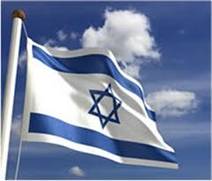
Israel’s flag was designed by a Lithuanian Jew.
The flag was initially made for the Zionist movement by David Wolffsohn (1856-1914), a Zionist leader from Lithuania’s Baltic Sea coast. The flag was first flown at the First Zionist Congress in Basel, Switzerland, in 1897, and became the official Israeli flag when the State of Israel was proclaimed in Tel Aviv on 14 May 14 1948.
David Wolffsohn was born in Darbenai, a village north of Palanga, in 1856 where he received a traditional Jewish education. He moved in 1872 to Memel (Klaipeda) and then again to East Prussia, finally making his home in Cologne in 1888. Here he became a successful businessman.
Wolffsohn had been active in Jewish affairs throughout his travels but it was in Cologne that he first became involved in Zionist activities. In 1893, together with Max Bodenheimer , he established the Cologne Association for the Development of Agriculture in the Land of Israel, which was one of the Hovevei Zion groups of the time. In 1896, immediately after he heard of Herzl's impending publication of Der Judenstaat, Wolffsohn travelled to Vienna, to meet with the future leader of the Zionist movement.
Wolffsohn soon became Herzl's associate and was a member of the Inner Actions Committee until 1904. He went with Herzl on his tour to Constantinople and Eretz¬Israel where they met with Kaiser Wilhelm II. Wolffsohn became one of the central figures in the establishment of the Jewish Colonial Trust and later became its first president. But in this capacity he experienced a number of differences with Herzl who despite his lack of financial experience interfered in the running of the bank.
Despite these difficulties, Wolffsohn remained loyal to Herzl even during the Uganda plan controversy and rather than to oppose the leader of the Zionist Organization, Wolffsohn maintained his silence.
After Herzl's death, Wolffsohn assumed the position of President of the World Zionist Organization continuing the political and diplomatic priorities of his predecessor. The practical Zionists and the Democratic faction opposed his re-election in 1911 although he continued his work with the Jewish Colonial Trust. He died on 15 September 1914, in Hamburg, Germany.
- Bookmark :
- Digg
- del.icio.us
- Stumbleupon
- Redit it
Napoleon named Vilnius ‘Jerusalem of the North’
- Posted by - 692(0) Commenthttps%3A%2F%2Fvilnews.com%2F2011-01-napoleon-named-vilnius-%25e2%2580%2598jerusalem-of-the-north%25e2%2580%2599Napoleon+named+Vilnius+%E2%80%98Jerusalem+of+the+North%E2%80%992011-01-09+12%3A41%3A400df53x21http%3A%2F%2Fvilnews.com%2F%3Fp%3D692

Napoleon’s soldiers at the Vilnius’ Old Town Hall, 1812.
It was a midsummer Wednesday year 1812. On this day, the 24th of June, Napoleon Bonaparte crossed the Nemunas River with his huge army, heading for Vilnius. Napoleon stayed in Vilnius for 18 days, until the 10th of July, awaiting the Russian Tsar's reply to his new peace offer. It is said that Napoleon himself became very surprised on what met him in Vilnius, a city so far away from the European mainstreams and still with a lively Mediterranean mood and life.
Napoleon was the one who started calling Vilnius ‘Jerusalem of the North’, and it was the first and only "Jewish city" Napoleon would ever see. He was no doubt aware of the Crusades, Inquisitions, pogroms and laws designed to discourage Judaic life. But there it was, right before his eyes, an exception to the rule.
And true enough, the history of the Litvaks, as the Lithuanian Jews were called, is unusual and surprising. It was a history of mostly peaceful coexistence with other peoples and cultures that lasted for more than six centuries. It was a history that spawned an incredible number of eminent Jews, not the least of whom was Elijah ben Solomon Zalman (1720-1797), also known as “The Gaon of Vilnius”.
The "Golden Age of Jewry" in Lithuania started with Grand Duke Gediminas (1275-1341), the empire builder who took a liking to foreigners and Jews whose skills and education were badly needed in medieval Lithuania. In the early 1300's he attracted them to his realm with numerous perks, including guarantees of religious freedom and tax exemptions. The Jews of Europe responded in droves, and Vilnius became the heralded centre of Jewish culture and learning. There would be synagogues, schools, theatres, publishing houses and the Yiddish Institute of Higher Learning. At a time when others in Europe were effectively illiterate, all the Jews in Vilnius could read and write. This was so unusual that it provoked the invention of a brand-new word, "Vilner," meaning "an educated man with knowledge." For almost 700 years, the Litvaks became an inseparable part of Lithuanian society, having enriched the country’s economy, culture, science, and education.
During the Second World War, about 200,000 (95%), Lithuanian Jews were murdered. This was the greatest loss in all of Eastern and Central Europe. The Nazi Holocaust led to an almost complete extermination of Lithuania’s Jews, and also destruction of their history and cultural monuments - a most tragic page of Lithuanian history.
- Bookmark :
- Digg
- del.icio.us
- Stumbleupon
- Redit it
The memory of my Kupiškes grandfather
- Posted by - 2638(3) Commenthttps%3A%2F%2Fvilnews.com%2F2011-01-the-memory-of-my-kupiskes-grandfatherThe+memory+of+my+Kupi%C5%A1kes+grandfather2011-01-09+12%3A21%3A340df53x21http%3A%2F%2Fvilnews.com%2F%3Fp%3D2638
![]()
|
|
|
|
“This postcard was the last sign of life my father had from his father. It was sent from my grandfather’s home here in Kupiskes (North Lithuania) in March 1941 to my father’s new home in Pretoria (South Africa), but my grandfather was most probably already dead when the postcard reached Pretoria late summer 1941. He was killed by the Nazis”. Attorney Ivor Feinberg, Lithuania’s consul in Pretoria, is obviously very touched when he visits his grandfather’s house in Kupiskes, telling us about the last memory of his grandfather – a memory not unlike many other stories related to the about 70,000 Jews of Lithuanian descent living in South Africa. Pictures: Aage Myhre |
|
Lithuanians dominate the Jewish community in South Africa to an extent seen in no other country, even their former home. "We have around 80,000 to 90,000 Jews in South Africa, and about 80 percent of them are of Baltic descent, most of them from Lithuania," said David Saks, an historian and researcher at the Jewish Board of Deputies in Johannesburg. "We probably have the most 'Lithuanian' Jewish community in the world," said Saks, whose own grandparents came from Lithuania. This ratio even exceeds that of Lithuania itself as most of the Baltic state's small Jewish community, now numbering a mere 5,000, is comprised mostly of immigrants who arrived from different parts of the Soviet Union after World War Two.The war devastated Lithuanian Jewry, once a leading centre of Jewish thought and culture. Historians estimate that 94 percent of the country's pre-war Jewish population of 220,000 perished in the Holocaust. The capital Vilnius, once known as the Jerusalem of the North, was home to a thriving community of 60,000 Jews, with more than 90 synagogues and the biggest Yiddish library in the world. Aside from one functioning synagogue, few traces of its rich Jewish past remain. "South Africa is more Litvak than Lithuania itself...we see our culture and society have been preserved there," said playwright and novelist Mark Zingeris, one of the few Litvaks remaining in Lithuania.
- Bookmark :
- Digg
- del.icio.us
- Stumbleupon
- Redit it
The Great Synagogue of Vilna
- Posted by - 701(3) Commenthttps%3A%2F%2Fvilnews.com%2F2011-01-litvak-studiesThe+Great+Synagogue+of+Vilna2011-01-09+12%3A20%3A390df53x21http%3A%2F%2Fvilnews.com%2F%3Fp%3D701
![]()
The great synagogue in Vilnius

The Great Synagogue of Vilna which once stood at the end of Jewish Street in the centre of Vilnius (where today’s courtyard between Vokieciu Street and Stikliu Street i located), was built between 1630-1633 after permission was granted to construct a synagogue from stone. Standing on the spot of an existing synagogue built in 1572, the site had first been used to house a Jewish house of prayer in 1440.
According to legend it was so magnificent and impressive, Napoleon who stood on the threshold of this synagogue in 1812 and gazed at the interior was speechless with admiration. The synagogue had a number of entrances. One, at street level, consisted of a pair of iron gates which, had been donated by a tailors’ society in 1640. The other entrance on the western side, added in 1800, was a bit more imposing. An elevated two-tiered wooden gable with a portal and wrought iron posts. There was a heavy iron door with an original Hebrew inscription indicating it was a gift of a "society of Psalm reciters" in 1642.
At the time of its building,ecclesiastical regulations all through Europe specified that a synagogue could not be built higher than a church. To obey the law, and yet create the necessary interior height, it was customary to dig a foundation deep enough for the synagogue’s floor level to be well below that of the street. Outside, the synagogue looked to be about three stories tall, but inside it soared to over five stories. Another entrance with a vestibule and the “pillory” was located on the northern side of the building.
The interior of the synagogue was redesigned in the mid-18th century by Vilnian German Johann Christoph Glaubitz. It had the overwhelming grandeur of an edifice in the style of the Italian Renaissance and an awe-inspiring atmosphere. Four massive, equidistant columns supported the vast stone-floored pile, and within them was the three-tiered ornate, rococo almemar, with a beautiful cupola, supported by eight small columns. It was built in the second half of the eighteenth century by Rabbi Judah ben Eliezer (commonly known as the YeSoD - an acronym of the three words Yehudah Sofer ve-Dayyan), the famous scribe and judge.
Interiors
The two-tiered Holy Ark on the eastern wall was a splendid structure, intricately carved with gilded woodcarvings, representing plants, animals and Jewish symbols, with a double-headed eagle on top. It was approached by a twofold flight of steps, with iron balustrades, ascending from the right and the left. Hanging from the walls and ceilings there were numerous bronze and silver chandeliers. The synagogue contained a valuable collection of ritual objects. The building was repaired in the 19th century.
Formerly there was an imposing seven-branched brass candelabrum in front of the Ark, but on the eve of the German invasion of the city during theWorld War I, it was sent off to Moscow. There also once was a “Chair of Elijah” in the northwest corner on which the rite of Brit milah was performed.
On both sides of the Holy Ark there were two-story structures, serving as the women’s sections, connected to the prayer hall by little windows. Another gallery for women was situated along the north side, also consisting of two floors built by Noah Feibusch Bloch, a community elder who advanced the money and when the community was unable to return the 14,000 gulden due, he made a present of the structure.
The main prayer hall was square and could hold 300 people. The synagogue was designed on a substantial and massive scale, for it was also intended to serve as a stronghold within which the Jews could take refuge in times of danger. On the High Holy Days before World War II the synagogue held 5,000 worshippers.
In 1846, when Sir Moses Montefiore visited the synagogue, the treasurers distributed entrance tickets to the masses of people.
The synagogue was partly destroyed by the Germans during World War II. The ruined synagogue and the whole “schulhof” complex which had grown around it were demolished by the Soviet authorities from 1955 to 1957 and were intentionally replaced by a basketball court and a school to effectively prevent any future initiatives to rebuilt a cultural monument.
Three original pieces from the Great Synagogue of Vilna survived the destruction quite miraculously and are now on display at the Vilna Gaon Jewish Museum: a door of the Holy Ark, a reader’s desk, and a bas-relief with the Ten Commandments.
Source: Wikipedia
|
|
- Bookmark :
- Digg
- del.icio.us
- Stumbleupon
- Redit it
OPINIONS
Have your say. Send to:
editor@VilNews.com
Ph. D., Chicago
A wave of unity sweeps the international Lithuanian community on March 11th every year as Lithuanians celebrated the anniversary of the Lithuanian Parliament's declaration of independence from the Soviet Union in 1990. However, the sense of national unity engendered by the celebration could be short-lived.
Human beings have a strong tendency to overgeneralize and succumb to stereotypical us-them distinctions that can shatter even the strongest bonds. We need only search the internet to find examples of divisive thinking at work:
- "Those who fled Lithuania during World II were cowards -- and now they come back, flaunt their wealth, and tell us 'true Lithuanians' how to live."
- "Lithuanians who work abroad have abandoned their homeland and should be deprived of their Lithuanian citizenship."
In Lithuania Christmas Eve is a family event and the New Year's Eve a great party with friends!
Lithuanian say "Kaip sutiksi naujus metus, taip juos ir praleisi" (the way you'll meet the new year is the way you will spend it). So everyone is trying to spend New Year's Eve with friend and have as much fun as possible.
Lithuanian New Year's traditions are very similar to those in other countries, and actually were similar since many years ago. Also, the traditional Lithuanian New Years Eve party was very similar to other big celebrations throughout the year.
The New Year's Eve table is quite similar to the Christmas Eve table, but without straws under the tablecloth, and now including meat dishes. A tradition that definitely hasn't changes is that everybody is trying not to fell asleep before midnight. It was said that if you oversleep the midnight point you will be lazy all the upcoming year. People were also trying to get up early on the first day of the new year, because waking up late also meant a very lazy and unfortunate year.
During the New Year celebration people were dancing, singing, playing games and doing magic to guess the future. People didn't drink much of alcohol, especially was that the case for women.
Here are some advices from elders:
- During the New Year, be very nice and listen to relatives - what you are during New Year Eve, you will be throughout the year.
- During to the New Year Eve, try not to fall, because if this happens, next year you will be unhappy.
- If in the start of the New Year, the first news are good - then the year will be successful. If not - the year will be problematic.
* If New Year's night is cold and starry - look forward to a good summer!
* If the during New Year Eve trees are covered with frost - then it will be a good year. If it is wet weather on New Year's Eve, one can expect a year where many will die and dangerous epidemics occur.
* If the first day of the new year is snowy - the upcoming year will see many young people die. If the night is snowy - mostly old people will die.
* If the New Year time is cold - then Easter will be warm.
* If during New Year there are a lot of birds in your homestead - then all year around there will be many guests and the year will be fun.
Christmas greetings
from Vilnius
and epic battle for the
future

Philosopher, political theorist, historian of
ideas, social analyst, and political
commentator
Ukraine was and continues to be perceived by the EU political class as a sort of grey zone with its immense potential and possibilities for the future, yet deeply embedded and trapped in No Man's Land with all of its troubled past, post-Soviet traumas, ambiguities, insecurities, corruption, social divisions, and despair. Why worry for what has yet to emerge as a new actor of world history in terms of nation-building, European identity, and deeper commitments to transparency and free market economy?
Right? Wrong. No matter how troubled Ukraine's economic and political reality could be, the country has already passed the point of no return. Even if Vladimir Putin retains his leverage of power to blackmail Ukraine and the West in terms of Ukraine's zero chances to accede to NATO due to the problems of territorial integrity, occupation and annexation of Crimea, and mayhem or a frozen conflict in the Donbas region, Ukraine will never return to Russia's zone of influence. It could be deprived of the chances to join NATO or the EU in the coming years or decades, yet there are no forces on earth to make present Ukraine part of the Eurasia project fostered by Putin.
want to learn about the
new, scary propaganda
war between Russia,
The West and the
Baltic States!
believe their government
is corrupt

students say no to
bribes for doctors


During Soviet times, government was administered for the people in control, not for the local population, court decisions were decreed, they were not the administration of justice, and academia was the domain of ideologues. 25 years of freedom and openness should have put those bad experiences behind Lithuania, but that is not so.
Today, it is a matter of expectation that court pronouncements will be governed by ideological dictates. Few, if any Lithuanians expect real justice to be effected. For foreign companies, doing business in Lithuania is almost impossible in a situation where business people do not expect rule of law, so, surely Government would be a refuge of competence?
Lithuanian Government has not emerged from Soviet styles. In an attempt to devolve power, Lithuania has created a myriad of fiefdoms of power, each speaking in the name of the Government, each its own centralized power base of ideology.

Chepstow, Wales
Doesn't that sound suspiciously like Lithuania? Ah, but I didn't mention the mountains of Snowdonia, which would give the game away.
I'm talking about Wales, that part of the UK which Lithuanians used to call "Valija", but later named "Velsas" (why?). Wales, the nation which has welcomed two Lithuanian heads of state to its shores - firstly Professor Vytautas Landsbergis, who has paid several visits and, more recently, President Dalia Grybauskaitė who attended the 2014 NATO summit which was held in Newport, South Wales.
ENGLISH VERSION OF THE
AUTOBIOGRAPHY OF VYTAUTAS LANDSBERGIS.


Although Lithuanian activities have thinned over the decades as that postwar generation died out, the Lithuanian Martyrs' parish hall is crowded with many, many hundreds of visitors who come to the Lithuanian cemetery for All Souls' Day. Similarly, the Franciscan parish has standing room only for Christmas Eve mass.
Although I am firmly embedded in the literary culture of Canada, my themes are usually Lithuanian, and I'll be in Kaunas and Vilnius in mid-November 2015 to give talks about the Lithuanian translations of my novels and short stories, which I write in English.
If you have the Lithuanian language, come by to one of the talks listed in the links below. And if you don't, you can read more about my work at
www.anatanassileika.com
http://www.vdu.lt/lt/rasytojas-antanas-sileika-pristatys-savo-kuryba/ https://leu.lt/lt/lf/lf_naujienos/kvieciame-i-rasytojo-59hc.html

"My love and best wishes to all. As long as VilNews exists, there is hope for the future,"" she writes.
Irena Veisaite means very much for our publication, and we do hereby thank her for the support and wise commitment she always shows.
You can read our interview with her
Facing a new reality

Dear readers of VilNews,
For a number of years, the EU and Russia had assumed the existence of a strategic partnership, based on the convergence of values, economic integration and increasingly open markets and a modernisation agenda for society.
Our agenda was positive and ambitious. We looked at Russia as a country ready to converge with "European values", a country likely to embrace both the basic principles of democratic government and a liberal concept of the world order. It was believed this would bring our relations to a new level, covering the whole spectrum of the EU's strategic relationship with Russia.
The likelihood of Putin
invading Lithuania
.jpg)
Founding Director at Summer Literary Seminars
Are all Lithuanian energy
problems now resolved?

Lithuania as a country does not have significant energy resources. Energy consuming infrastructure after WWII was small and totally supported by energy imports from Russia.
First nuclear reactor begins power generation at Ignalina in 1983, the second reactor in 1987. Iganlina generates enough electricity to cover Lithuania's needs and about 50%.for export. As, prerequisite for membership in EU, Ignalina ceases all nuclear power generation in 2009
The Klaipėda Sea terminal begins Russia's oil export operations in 1959 and imports in 1994.
Mazeikiu Nafta (current ORLEAN Lietuva) begins operation of oil refinery in 1980.
Have Lithuanian ties across
the Baltic Sea become
stronger in recent years?

The two decades that have passed since regaining Lithuania's independence can be described as a "building boom". From the wreckage of a captive Soviet republic, a generation of Lithuanians have built a modern European state, and are now helping construct a Nordic-Baltic community replete with institutions intended to promote political coordination and foster a trans-Baltic regional identity. Indeed, a "Nordic-Baltic community" - I will explain later in my text the meaning of this catch-phrase.
Since the restoration of Lithuania's independence 25 years ago, we have continuously felt a strong support from Nordic countries. Nordics in particular were among the countries supporting Lithuania's and Baltic States' striving towards independence. Take example of Iceland, country which recognized Lithuania in February of 1991, well in advance of other countries. Yet another example - Swedish Ambassador was the first ambassador accredited to Lithuania in 1991. The other countries followed suit. When we restored our statehood, Nordic Countries became champions in promoting Baltic integration into Euro-Atlantic institutions. To large degree thanks Nordic Countries, massive transformations occurred in Lithuania since then, Lithuania became fully-fledged member of the EU and NATO, and we joined the Eurozone on 1 January 2015.

Have you heard about the
South African "Pencil Test"?

But that is exactly what happened to me when I came back from South Africa. I will tell you how.
VilNews e-magazine is published in Vilnius, Lithuania. Editor-in-Chief: Mr. Aage Myhre. Inquires to the editors: editor@VilNews.com.
Code of Ethics: See Section 2 – about VilNews. VilNews is not responsible for content on external links/web pages.
HOW TO ADVERTISE IN VILNEWS.
All content is copyrighted © 2011. UAB ‘VilNews’.

















